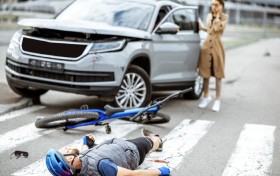With bicycles becoming an increasingly common sight on the streets, the potential for accidents and injuries has risen. When these incidents happen, it’s crucial for those involved to be aware of their legal rights and the process for claiming compensation.
That said, this article will provide clear guidance on determining who’s at fault, what compensation might be available, and why getting professional legal help, such as a bicycle accident lawyer in Orange County can be beneficial.
Determining Liability In Bicycle Accidents
When a bicycle accident occurs, the first step in seeking compensation is identifying who is liable for the incident. Liability may fall on various parties, and it’s crucial to determine the responsible party to pursue a claim successfully. Here are some common scenarios and their associated liabilities:
1.Driver’s Negligence
If a motor vehicle driver’s negligence caused the accident, they are typically held responsible. This could involve running a red light, speeding, or failing to yield to the cyclist. The injured cyclist can file a claim against the driver’s insurance company to seek compensation for their damages.
However, it’s important to note that the success of such a claim often depends on gathering evidence like witness statements, police reports, and sometimes even accident reconstruction experts.
2.Defective Road Conditions
Sometimes, accidents occur due to poorly maintained or defective road conditions, such as potholes, debris, or inadequate signage. Liability may then rest with the government entity responsible for road maintenance.
Claims against governmental entities often have specific procedures and time limits, so consulting an attorney is crucial. Additionally, documenting the state of the road during the accident through photographs and reports becomes pivotal in proving your case.

Bike injuries. Man cyclist fell fell off road bike while cycling. Bicycle accident, injured knee.
3.Negligence Of Other Cyclists Or Pedestrians
Liability may also extend to other cyclists or pedestrians if their negligence contributed to the accident. For example, a pedestrian suddenly stepping into a cyclist’s path without warning could result in shared liability. It’s vital to gather witness accounts and statements to accurately establish the roles of all parties involved in the accident.
4.Manufacturer’s Defects
Sometimes, accidents can occur due to manufacturing defects in the bicycle or its components. If these defects played a role in the accident, the bicycle manufacturer or distributor might face liability. In such instances, you can pursue a product liability claim. To substantiate these claims, you should enlist the expertise of professionals to analyze the bicycle and its components thoroughly.
5.Comparative Negligence
Determining liability isn’t always straightforward; sometimes, the cyclist and another party might bear some degree of responsibility for the accident. Typically, in states with comparative negligence laws, compensation is distributed proportionally according to the assigned fault levels of each party involved.
Seeking Compensation For Bicycle Accident Damages
Once liability is determined, the next step is to seek compensation for the damage you’ve incurred. Compensation can cover various losses, including:
- Medical Expenses
This category includes immediate medical costs, ongoing medical treatment, and rehabilitation. Keeping detailed records of all medical expenses, including bills, receipts, and invoices, is essential to ensure you are fully compensated for your medical needs.
- Lost Wages
If the injuries sustained in the accident prevented you from working, you may be entitled to compensation for lost income and potential future earnings. Calculating lost wages can be complex, particularly if you have a variable income or if the accident has left you with a long-term disability. Consultation with a financial expert or economist may be necessary to determine these losses accurately.
- Pain And Suffering
Non-economic losses, such as physical pain, emotional suffering, and a diminished quality of life, are also eligible for compensation. Assessing and quantifying these damages can prove difficult since they are subjective and differ from one individual to another. Engaging an experienced personal injury attorney is crucial, as they can evaluate the impact of these losses on your life and work to secure suitable compensation through negotiations.
- Property Damage
Compensation may cover repairing or replacing your bicycle and any other damaged personal property, such as cycling gear or accessories. Be sure to document the extent of property damage thoroughly, including photographs and estimates for repairs or replacement.
- Wrongful Death
In unfortunate instances where a bicycle accident leads to a loss of life, the deceased person’s surviving family members have the option to initiate a wrongful death claim. This legal action aims to secure compensation to cover funeral costs, the loss of financial support, and the emotional distress endured by the bereaved family.
Navigating The Legal Process
Understanding liability and compensation in bicycle accidents is essential, but the legal process can be intricate. To maximize your chances of obtaining fair compensation, consider these steps:
1.Consult A Bicycle Accident Lawyer
A seasoned attorney who specializes in bicycle accidents possesses the ability to assess your case, collect evidence, engage in negotiations with insurance companies, and, if required, act as your legal representative in court.
2.Document The Accident
Gather evidence such as photographs, witness statements, police reports, and medical records to support your claim.
3.Keep Records
Maintain a detailed record of all expenses related to the accident, including medical bills, repair estimates, and any out-of-pocket costs.
4.Act Promptly
Statutes of limitations vary by state, so acting promptly and filing your claim within the specified timeframe is crucial.
5.Avoid Speaking To Insurance Adjusters
Be cautious when communicating with insurance companies. They may attempt to minimize your claim, so consulting with an attorney before making any statements is advisable.
Conclusion
Understanding liability and compensation for bicycle accidents is vital to protect your rights and recover damages following an unfortunate incident. By following these steps and seeking professional assistance, you can navigate the legal process effectively and work towards rebuilding your life after a bicycle accident.




